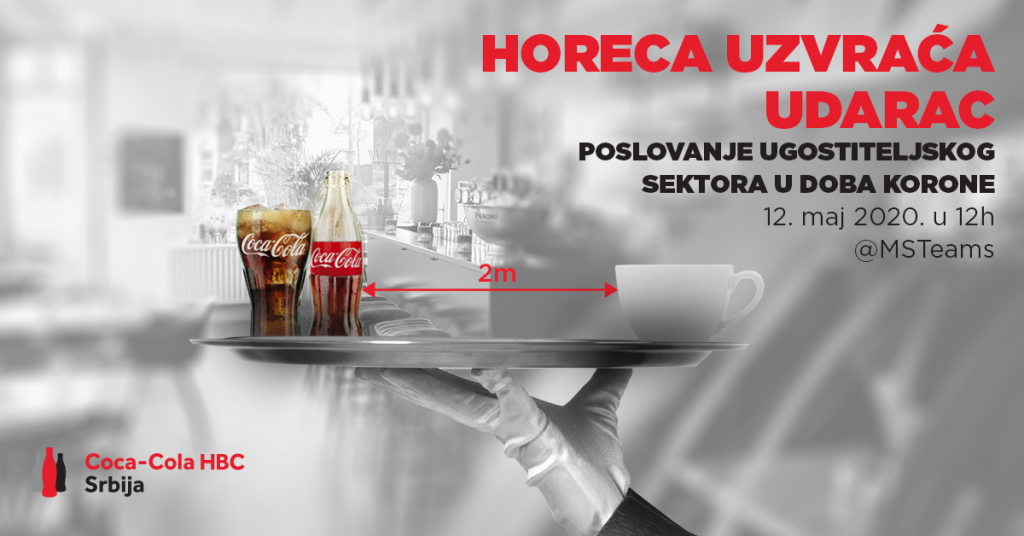Online panel on the HoReCa sector business operations in new circumstances and its recovery raised interest among the sector representatives

The hospitality sector is deeply affected, but it is gradually resuming activities, as concluded at a panel organised by Coca-Cola HBC Serbia, marking the initiation of a dialogue about the HoReCa sector, which employs more than 65 000 people in Serbia and is one of the most affected areas due to coronavirus. Four topic discussions, moderated by Đorđije Stajkić, gathered online more than 150 representatives of the largest clubs, bars, restaurants and cafe chains, Chamber of Commerce and Industry of Serbia and HORES Association, and resulted in a range of observations about the new changed reality after the state of emergency cancellation.
Hotels, bars and night clubs, which were closed among the first after the state of emergency declaration, suffer the highest losses, because they are still not open. Foreigners, who account for one-third of guests in Belgrade, are not expected in the near future, while rent and labour costs are still there. The situation with restaurants and cafes is somewhat better, as they have recently been opened for guests, with new safety measures. Their capacities are 30% to 50% full, and owners hope that it will soon change for the better. However, no one expects the business operation to return to the pre-pandemic level in the next year.
“We need to realise that hospitality services are not a luxury; they are a relevant industrial sector, employing several tens of thousands of people, and they need serious assistance to overcome this crisis. For instance, it is estimated that hotels will lose about EUR230 million, with those in Belgrade accounting for cca EUR130 million, due to the coronavirus pandemic and the halted inflow of guests. There are around 3000 restaurants in Serbia, so you can see what losses we are talking about,” said Aleksandar Vasilijević, Chairman of the BoD of the Hotel and Restaurant Association HORES.
The government’s assistance measures are assessed as crucial by the panellists for the HoReCa sector to start recording growth. The establishment of a taskforce, comprising representatives of the business sector, HoReCa owners and the government, aimed at specifying assistance measures is announced.
“We expect the taskforce to be set up soon, in the next several days. Furthermore, HoReCa business may consider the criteria for taking loans with favourable repayment terms with the Republic of Serbia’s Development Fund. Regarding other additional measures of assisting the HoReCa sector, conditions are expected to be announced by the end of the month,” said Bojan Stanić, Assistant Director, Sector for Strategic Analyses, Services and Internationalisation, Chamber of Commerce and Industry of Serbia.
Representatives of Coca-Cola HBC Serbia say that, as a responsible company and a partner of many HoReCa businesses, aimed to initiate these topics in order to offer their expertise and assistance in the recovery of the HoReCa sector.
“Our company has also experienced negative effects of the global pandemic. From the start, we have undertaken all measures in order to protect our employees and associates, as well as to ensure sustainable operation in the future as well. Therefore, we had to come up with some new methods of doing business quickly. As one of the leaders, we believe that we can find a way to continue where we left off, but also to offer assistance and some new solutions to associates. For more than 50 years, Coca-Cola HBC Serbia has been a member of the community and a partner of the HoReCa sector. We have organised this panel because we think that the HoReCa sector is currently the most threatened and we believe that we should be there for one another,” said Saša Marković, Sales Director, Coca-Cola HBC Serbia.
Although seriously upset, the HoReCa sector can get back on its feet, but the recovery of the economy will take a long time, the panellists concluded. The sector is expected to keep jobs to some extent, provide high-quality service and create appealing programs to attract guests, while the government is expected to assist it with incentive measures.